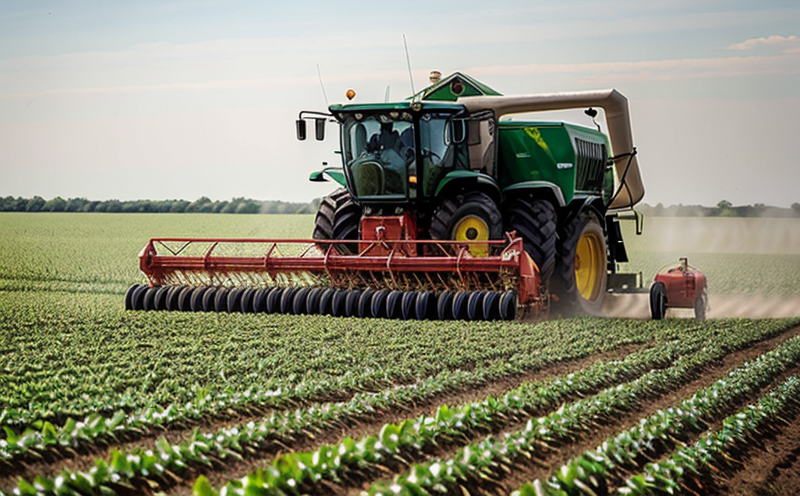Root Biomass Yield Testing
The root system of crops plays a critical role in nutrient and water uptake, which directly influences overall crop yield and productivity. Root biomass yield testing is essential for understanding the health and performance capabilities of roots under different environmental conditions or after application of various treatments such as fertilizers, pesticides, or new plant varieties.
Roots are often overlooked compared to above-ground parts when assessing crop health and productivity. However, their contribution cannot be understated. Roots influence water use efficiency, nutrient uptake, and contribute significantly to soil structure stability. Therefore, accurate measurement of root biomass is crucial for optimizing agricultural practices, enhancing crop resilience, and achieving sustainable agricultural outputs.
The testing method involves several steps including the collection of roots from the field or greenhouse setting, washing them thoroughly to remove excess soil, drying, weighing, and measuring dimensions. The specimen preparation ensures that all parts of the root system are accounted for, which is critical for generating accurate data on biomass yield. Once prepared, advanced analytical equipment such as moisture analyzers and scales calibrated specifically for small weights provide precise measurements.
The results from this testing can be used to compare different plant varieties or treatments in a controlled manner. For instance, researchers might examine how varying soil types affect root growth or assess the efficacy of new fungicides by comparing treated plots with untreated ones. The data helps in making informed decisions about crop management strategies aimed at improving yield and sustainability.
Compliance officers will find this information valuable for ensuring that agricultural practices meet regulatory standards related to environmental impact assessments, pesticide usage, and water conservation measures. Quality managers can use these insights to refine their processes, while R&D engineers benefit from identifying areas where genetic modifications or biotechnology could enhance root function further.
Root biomass yield testing also supports the development of more resilient crops capable of thriving in challenging environments. By understanding what factors promote robust root systems, scientists and farmers alike can work towards creating varieties that are better equipped to withstand climate change impacts like increased droughts or salinity levels.
Why It Matters
The health of root systems is intrinsically linked to the overall productivity and sustainability of agricultural practices. Inefficient root growth can lead to reduced water absorption, which in turn affects photosynthesis rates and subsequent biomass production. This relationship underscores why accurate quantification of root biomass yields is vital.
- Enhances understanding of plant adaptation mechanisms to different environments
- Promotes development of more resilient crop varieties
- Supports better nutrient management and fertilizer application practices
- Aids in assessing the efficacy of pest control measures on root health
- Facilitates identification of optimal soil conditions for specific plant species
- Makes possible comparative studies between traditional and genetically modified crops
Furthermore, by tracking changes over time or across different treatment groups, researchers gain valuable insights into how various factors influence root development. This knowledge is instrumental in formulating effective strategies aimed at maximizing crop yields while minimizing resource use.
Benefits
- Agricultural Optimization: Identifies key factors affecting root health and productivity, enabling better decision-making for optimizing agricultural practices.
- Sustainable Farming: Helps in developing more resilient crop varieties that can thrive under varying environmental conditions.
- Better Resource Management: Enables efficient use of water and nutrients by understanding how different treatments impact root growth.
- Pest Control Efficacy: Assesses the effectiveness of pest control methods on root health, informing more targeted approaches to protect crops.
- Variety Comparison: Allows for comparative studies between traditional and genetically modified crop varieties under controlled conditions.
The insights gained from root biomass yield testing contribute significantly to sustainable agricultural practices by promoting resource efficiency and enhancing plant resilience. These benefits extend beyond individual farms, contributing positively to global food security efforts through increased productivity and reduced environmental impact.
Why Choose This Test
- Precision: Utilizes advanced analytical equipment to ensure accurate measurements, providing reliable data for comparison and analysis.
- Controlled Conditions: Specimen preparation ensures all parts of the root system are accounted for, leading to precise biomass yield figures.
- Comprehensive Analysis: Offers detailed breakdowns of root structure and health metrics that go beyond simple weight measurements.
- Regulatory Compliance: Supports adherence to relevant agricultural regulations concerning environmental impact assessments and pesticide usage.
- Innovation Support: Facilitates the development of new plant varieties tailored specifically for challenging environments, benefiting both commercial growers and small-scale farmers.
The combination of precision, accuracy, and comprehensiveness makes root biomass yield testing an indispensable tool in modern agricultural research. Its ability to provide actionable insights into crop performance contributes significantly to sustainable farming practices, making it a valuable asset across various sectors within the agriculture industry.





